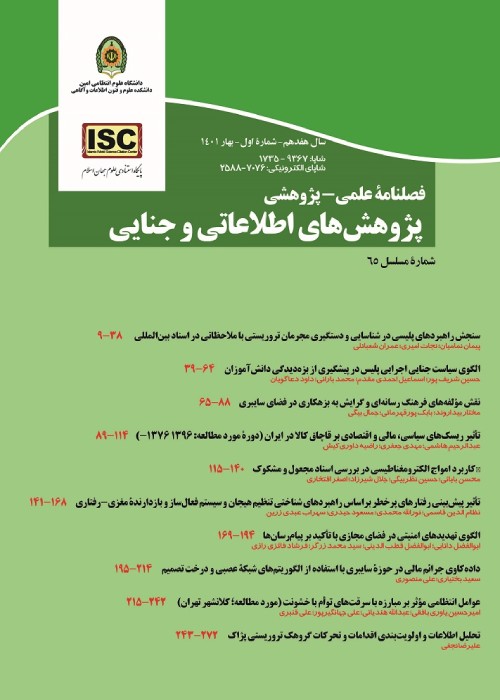Conceptual model of Criminogenic Cognitions based on the analysis of the life narration of cybercriminals
Criminogenic Cognitions have weakened the relationship between moral standards and personal behavior and they emphasize criminal attitudes as the main reasons in the occurrence and maintenance of criminal behavior. The purpose of this study is to identify Criminogenic Cognitions in cybercriminals.
The current study has been implemented in terms of data collection a qualitative research with a pluralistic approach and in terms of research method using Grounded Theory. Statistical population of the study consisted of cybercriminals who arrested by Tehran cyber police in 2017 and 2018 and 23 persons of them were selected by targeted sampling. The main research data collection tools were the semi-structured interviews and the revised form of McAdams, which continued till theoretical saturation, then data was implemented and extracted so as to draw the developed conceptual model. At first those researches which have been done toward criminogenic cognitions and theories are utilized as a source of data then, identified criminogenic cognition components are used for drawing the default conceptual model. In order to develop conceptual model of criminogenic cognitions relating to cybercriminals, it was used narrative analysis with a pluralistic approach.
The findings showed that criminal psychological cognitions (including obsessive-compulsive personality, anxiety, mood, sex and aggression); Individual criminal cognitions (including coping styles, identity styles, schemas, defense mechanisms, etc.), interpersonal and environmental cognitions of the crime (including functional disorders of family, communication with friends, opposite sex, Couples' conflicts and problems with education and school) and finally social-criminal cognitions in cybercriminals are observed.
criminogenic cognitions lead to the formation of attitudes, beliefs and norms in cybercriminals and creation of psychological and personal characteristics affect the motivation (intent of criminal behavior) and committing cybercrimes by criminals. Therefore, it is suggested that due to the nature and characteristics of cyberspace, in spite of identifying techniques and characteristics of cybercriminals, preventative measures will be done by Cyber Police.
- حق عضویت دریافتی صرف حمایت از نشریات عضو و نگهداری، تکمیل و توسعه مگیران میشود.
- پرداخت حق اشتراک و دانلود مقالات اجازه بازنشر آن در سایر رسانههای چاپی و دیجیتال را به کاربر نمیدهد.


